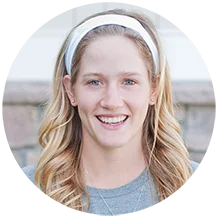
March 8th is International Women’s Day. To celebrate, this month we’re running a series of blogs about women in technology. We are thankful for the unique perspective the women in our company, and the women throughout history, bring to the field of technology. Libby Edwards is a senior at Taylor University and a software engineer apprentice with EduSource. She and her husband are having fun raising their puppy, Nala.
My Story
As I was preparing to graduate from high school, I still had no clue what major or what school to choose. My dad, a computer engineer, convinced me that I should give technology a try. He believed I was smart enough; I was a woman, which meant getting a job would be easy; and the pay was good. I decided to give it a chance.
Sitting in my Introduction to Computer Science class my freshman year of college, with zero prior knowledge about programming, I felt very nervous. The room had 25 boys and 3 girls (including me). By the end of the first day, some of the guys beside me had already customized their development environments, which only increased the intimidation factor.
Ever since day one, I have felt somehow behind everyone in the classroom. It wasn’t until recently that I realized it is mainly because I am one of only a few women in the Computer Science department at Taylor. I put pressure on myself because I feel that I, as a woman, do not fit into the stereotype of a programmer: I don’t enjoy playing computer games and learning about the greatest new technology that is just about to come out like many of my peers do. In talking with a few other women in my department, we realized that we all feel extra pressure in the classroom that we need to succeed in order to prove ourselves to the guys in the class and show them we are meant to be there.
Ever since day one, I have felt somehow behind everyone in the classroom. It wasn’t until recently that I realized it is mainly because I am one of only a few women in the Computer Science department at Taylor.
Finding My Place
What I have discovered recently (although my superiors and coaches at EduSource have been telling me this repeatedly since I joined the team), is that, as a woman, I bring unique talents to the team. EduSource hired me not because of my amazing programming skills (although I know there are women out there who are amazing programmers), but because I bring a distinct perspective to problem solving. I’m learning that I need to stop comparing myself to how the guys around me are programming and begin focusing on how I can contribute best to my team.
In my senior capstone class we read a book written by Derek C. Schuurman called Shaping a Digital World: Faith, Culture and Computer Technology. In this book, Schuurman says this about women in technology: “…women generally take a different approach to computing and are more interested in linking computer science to social concerns and caring for people.” That hits home for me as I continue to discover why I enjoy working in technology. My main motivation for working at EduSource has always been about the people more than the code. At the end of the day, I know that I’m building relationships with my coworkers and doing work that makes an impact in our clients’ lives.
One of my favorite things about being educated in a male-dominated classroom and working together with mainly males is the brotherly relationships that come out of it. After a few short months of working with EduSource, I instantly felt that all of my coworkers truly valued me as a sister or a good friend. They would even fight over who would open the door for me! I have many fond memories of my coworkers making me feel equal to them in a field where not many women may get to experience that equality.
One of my favorite things about being educated in a male-dominated classroom and working together with mainly males is the brotherly relationships that come out of it.
My Perspective
If I were to tell younger women pursuing technology careers one thing, I would say don’t worry about fitting “the mold.” I assumed that because I didn’t fit that mold, I was not as important or as valuable as my team members who did fit that mold. As I come to the end of my undergraduate career, I am realizing that I need to use my gifts and talents as a woman for the good of my team, rather than brushing them to the side in order to fit in with everyone else.

Recent Comments